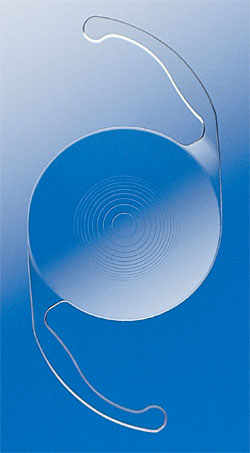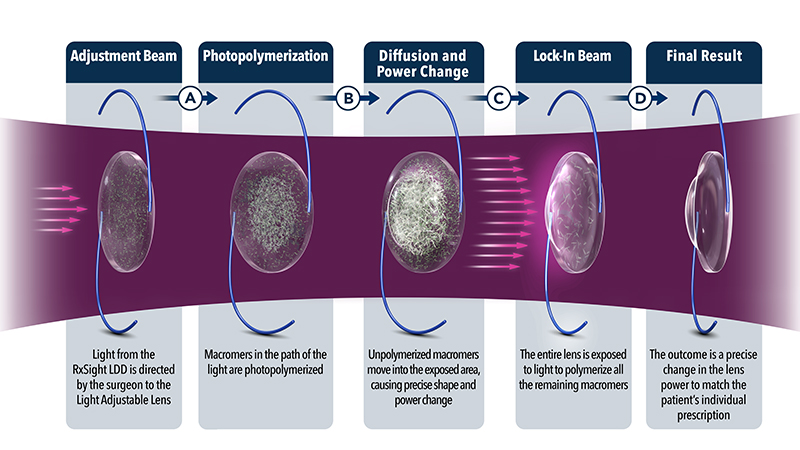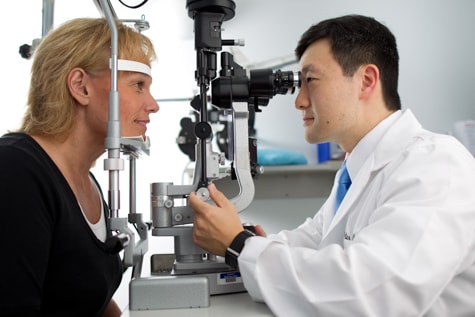Monofocal Lens
The most commonly implanted replacement lens for cataract surgery is called a monofocal lens. The majority of patients pick a monofocal lens because private insurances and Medicare typically cover most of the costs. There are no additional upgrade costs associated with this lens. Monofocal lenses with cataract surgery provide one best focal point and do not correct for astigmatism. This means you will either be able to see up-close or in the distance, but not both. Many patients prefer the distance focus so that they can perform distance type activities such as driving and watching their favorite sport, without needing glasses, but they still need to wear reading glasses for near activities. Most patients that choose a monofocal lens will require glasses after cataract surgery for crisp distance and reading vision.
Toric Lens
About half of the population is born with corneas that are shaped in a way that creates astigmatism. Astigmatism refers to an irregularly shaped cornea that is unable to adequately refract light onto your retina. Astigmatism causes blurry vision and eyeglasses or contact lenses are required to see and focus clearly. In order to correct for astigmatism, you may want to consider a toric lens with cataract surgery. Toric lenses provide one best focal point and help correct naturally occurring astigmatism but still require patients to use glasses after cataract surgery to see near or far. Most patients select a toric lens to achieve distance vision with as little need for glasses as possible. The toric lens is considered a premium lens implant which is not typically covered by insurance. As such, an upgrade cost is associated with this lens, so ask your cataract specialist for more information on this lens option.
Multifocal Cataract Lenses: Bifocal & Trifocal Lenses
People who dislike the thought of wearing glasses all together and desire to be less dependent on glasses may want to consider a multifocal lens such as a bifocal or trifocal lens after cataract surgery. Specifically, these lenses can help correct for presbyopia. Presbyopia is a part of the normal aging process, making it difficult to see well up close to read or see the computer. When this happens, patients start wearing reading glasses or need bifocal eyeglasses.

Multifocal lenses including bifocal and trifocal lenses not only help correct presbyopia by providing good near vision but may also help intermediate and far vision. Additionally, these lenses can correct for astigmatism, a refractive disorder in which your cornea is irregularly shaped. This means that glasses are frequently not required after surgery if one of these lenses is chosen. While there is no guarantee that a person who has a multifocal lens implant will be completely free from a need for glasses in all circumstances, many people enjoy functional vision without glasses for most of their daily activities.
RxSight™ Light Adjustable Lens
Another multifocal lens option, is the newest cutting-edge Light Adjustable Lens (LAL) technology. This technology allows more customization to your vision through light therapy ensuring you receive the best vision potential. The LAL implant changes shape and power through a response to ultraviolet (UV) light treatment following cataract surgery. Our skilled physicians at Wolfe Eye Clinic preform this treatment through an in office procedure utilizing a Light Delivery Device (LDD) at your post operative appointments. You may have up to three LDD treatments before you are comfortable with your overall vision outcome. By having the ability to adjust your vision to meet your lifestyle, this lens offers a wide array of possibilities to start your journey towards new and improved vision. 
Cataract Surgery: What Type of Lens Do You Qualify For?
Some people are not eligible for all of the lenses because of other eye conditions. Eyes must be healthy in every other way for the multifocal lenses to function properly. It is important to speak with your cataract surgeon to ask questions about the lens you qualify for and your lifestyle and vision goals. Multifocal lenses and the Light Adjustable Lens are considered premium lenses and thus, are not typically covered by insurance. More information can be provided at your cataract evaluation. The cataract specialists at Wolfe Eye Clinic were the first in Iowa to place the Alcon PanOptix® Trifocal Intraocular Lens in 2019 and the new RxSight™ Light Adjustable Lens in 2024. Our physicians can guide you in discussion over which option is best for you!
How long does it take to recover from cataract surgery?
Recovery from cataract surgery does not take long, typically. Most patients are back to their normal activities within a day or two such as watching TV and using a computer. .png) Patients are able to return home the day of the procedure with the assistance of a driver. Depending on the replacement lens placed, you may need glasses for either distance or near vision following cataract surgery. As with any surgery, there are potential side effects including inflammation, changes in eye pressure and retina swelling as well as rare risks such as infection, bleeding, pain and loss of vision. Your cataract surgeon will have discussed with you what to expect and possible complications prior to surgery. Throughout the process, our staff is here for you along the way.
Patients are able to return home the day of the procedure with the assistance of a driver. Depending on the replacement lens placed, you may need glasses for either distance or near vision following cataract surgery. As with any surgery, there are potential side effects including inflammation, changes in eye pressure and retina swelling as well as rare risks such as infection, bleeding, pain and loss of vision. Your cataract surgeon will have discussed with you what to expect and possible complications prior to surgery. Throughout the process, our staff is here for you along the way.
Can cataracts come back?
Cataract surgery is permanent, meaning a cataract will not grow back as the natural lens has been removed and replaced. In some cases, the tissue surrounding your new artificial replacement lens can thicken and become cloudy. This is referred to as posterior capsular opacification (PCO) or capsular fibrosis. While patients with other health issues such as diabetes may be at a higher risk, the condition is fairly common and clear vision can be quickly restored using a YAG laser during a follow-up appointment at Wolfe Eye Clinic. The process takes only moments and is painless.
How much does cataract surgery cost?
The cost for cataract surgery depends on several factors. Generally, Medicare and most other health insurance providers cover the cost of cataract surgery, less the deductible amount or co-insurance required by your plan. This coverage includes the cost of a standard replacement lens called a monofocal lens. The monofocal lens provides one best focal point, either up-close or in the distance, but does not help with both or astigmatism, also known as an irregularly shaped cornea. If you have astigmatism, struggle with glare and night driving or want to reduce your need for glasses after cataract surgery, you may want to consider upgrading your cataract lens to a premium lens implant. Premium lenses are an out-of-pocket expense and are not covered by Medicare or health insurance. Typically, the standard lens cost is covered, and patients are asked to pay this additional amount. Your cataract surgeon team can help answer questions about the cost of lens options during your cataract evaluation appointment.
Cataract Specialists Near You
If you believe you or a loved one may have a cataract developing, the first step is setting up a cataract evaluation with one of our cataract specialists near you. Give us a call at (833) 474-5850 or speak with your local optometrist to get the process started.
 The purpose of your cataract evaluation is to not only thoroughly examine your quality of vision and cataract development but also to establish a cataract treatment plan and select a cataract lens based on your lifestyle preferences and vision goals. You do not need a referral for cataract surgery or the initial cataract evaluation at Wolfe Eye Clinic. However, visiting your eye doctor (i.e., optometrist) regularly is the best way to detect cataracts early. Your optometrist can help you find a cataract surgeon by making a referral to a Wolfe Eye Clinic cataract specialist near you.
The purpose of your cataract evaluation is to not only thoroughly examine your quality of vision and cataract development but also to establish a cataract treatment plan and select a cataract lens based on your lifestyle preferences and vision goals. You do not need a referral for cataract surgery or the initial cataract evaluation at Wolfe Eye Clinic. However, visiting your eye doctor (i.e., optometrist) regularly is the best way to detect cataracts early. Your optometrist can help you find a cataract surgeon by making a referral to a Wolfe Eye Clinic cataract specialist near you.
How to choose a cataract surgeon
Choosing the best cataract surgeon is an easy decision with Wolfe Eye Clinic. Not only are our cataract surgeons well trained and experienced ophthalmologists that live in Iowa and care for Iowans daily, but they are also highly referred to by optometrists across the state. While not required, our strong referral relationships with these eye doctors allows your optometrist to easily refer you directly to a Wolfe Eye Clinic surgeon. Plus, you have the option to see your local optometrist following surgery, close to home, for post-operative care that is co-managed with your Wolfe Eye Clinic surgeon. We make all the arrangements; it’s really that easy!
For over 100 years, our surgeons have remained committed to staying at the forefront of advancements in technology and care. Wolfe Eye Clinic helped lead the way for cataract surgery in Iowa. Back in the 1930’s, we were instrumental in making cataract surgery safer and recovery time shorter and have since continuously offered new cataract treatment options and advanced replacement lenses for cataracts before many other providers in the state. Most recently, we were the first in Iowa to offer the RxSight™ Light Adjustable Lens in 2024, helping improve patients’ overall vision through custom light treatments.
Having performed hundreds of thousands of cataract surgeries across Iowa, you can be sure your eyes are in the right hands at Wolfe Eye Clinic. Thank you for considering us and we look forward to helping you achieve Better Vision for a Better Life®. Our surgeons provide evaluations for cataracts across that state with locations in Ames, Ankeny, Carroll, Cedar Falls, Cedar Rapids (Hiawatha), Des Moines, Fort Dodge, Iowa City, Marshalltown, Ottumwa, Pleasant Hill, Spencer and Waterloo. To learn more or to schedule a cataract evaluation, call (833) 474-5850, or fill out our form here.